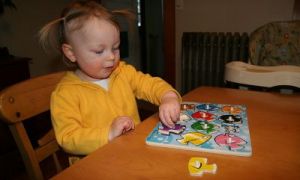It's always difficult to bring up behavioural issues with parents, it can be nerve wrecking to tell a parent that their child misbehaves but that shouldn't stop you from doing it.
The following provides information for Educators on how to talk to parents about their child's behavioural issues.
Before you talk to Parents you need to consider what is causing the child's misbehaviour, could it be something happening at home, a new baby, parents going through a divorce, is the child feeling unwell, could it be overstimulation of activities or boredom? There is a lot to consider.
When considering the cause of behaviour take observations which you can use to work out the cause, you can also gather information from the parents by asking (not being intrusive) if they had noticed changes to the child, how are things at home etc. Note these down for your reference.
Once you work out the behavioural issue and what's causing it, you need to implement strategies to stop the misbehaviour from occurring. If you notice the behaviour not improving or it's getting worse then you need to talk to the parents about it.
When talking to parents about their child's behaviour, try not to have a list of issues, beforehand you can have an informal chat about day to day issues. For e.g "Mark was having a little trouble listening during group time, so I moved him to the front and he enjoyed listening to the story". Now you don't need to do this for every single behavioural issue, just the ones that you feel the parents need to be aware of or that you are constantly trying to deal with. When you talk to the Parent about the behavioural issues you don't want them saying"why didn't you tell me earlier" etc. So, having an informal chat will give Parents a heads up as well.
Strategies When Talking To Parents About Behaviour
During the meeting
- Always have this discussion privately. Don't discuss issues in front of children, parents or other Educators.
- Be confident and friendly.
- Speak in a calm voice - watch your tone
- Include positive observations about the child, such as “We love having your child with us, he is so creative and always manages to make us laugh”.
- When discussing behavioural issues describe behaviours that you have observed, go through observations you have recorded, when the behaviour occurs, what happens etc. If there are other children involved respect their privacy and don't name them.
- Don't judge or criticise the child or the behaviour. For example "he was bullying another child", "he was being mean", "he is always so naughty". State the behaviour you have observed ONLY!
- Talk to the Parent about strategies you have implemented and what has been working or hasn't.
- Create a behaviour management plan if necessary to identify key issues, strategies to work on at the centre and at home, identify boundaries etc.
- Clarify any questions the parent may have.
- Keep answers short and to the facts.
- Remember it's a conversation, not a lecture!
Ending the Meeting
- Thank the parent for having the conversation with you. You may want to acknowledge that you know it was a difficult conversation and that you really appreciate how much they care for their child.
- Give Parents a follow up after a few days to see if the behavioural issues have improved or how they are going with the strategies discussed at home etc.
- Continue to follow up with the Parents about the child's behaviour. Make it a point to list positive progress the child has shown within the service.
It's important for Educators and parents to work together to deal with the behavioural issues between home and the service to ensure that the behaviour is dealt with efficiently and diligently. Focus on a shared commitment to children’s safety, and emphasizing that you want what is safest for all children.
For more information on Behaviour management Plans, please read the following: Behaviour Management
Reference:
"How to Talk to Parents About Their Child's Behaviors", StopItNow



 Working as a childcare professional can be a challenge especially when dealing with behavioural problems which may arise. The techniques we use when dealing with
Working as a childcare professional can be a challenge especially when dealing with behavioural problems which may arise. The techniques we use when dealing with There are different types of behaviour that children can display and sometimes it can be hard to manage, especially if a child is having behavioural
There are different types of behaviour that children can display and sometimes it can be hard to manage, especially if a child is having behavioural As a parent, your behavioural expectations of your child can be higher than what is actually developmentally appropriate for your child's age.
As a parent, your behavioural expectations of your child can be higher than what is actually developmentally appropriate for your child's age.
 As Educators, there will be many instances where you will need to write about a child's behaviour. For a behaviour management plan, assessments, half-yearly or
As Educators, there will be many instances where you will need to write about a child's behaviour. For a behaviour management plan, assessments, half-yearly or As Educators when communicating with Parents (through verbal or non-verbal communication), there will be times where we need to discuss issues or concerns that may
As Educators when communicating with Parents (through verbal or non-verbal communication), there will be times where we need to discuss issues or concerns that may Challenging Behaviour is when a child does something that hurts themselves and/or other people.
Challenging Behaviour is when a child does something that hurts themselves and/or other people.
 As part of your child's development it is normal for your child to have anxiety and fears. A baby commonly shows a fearful sign to
As part of your child's development it is normal for your child to have anxiety and fears. A baby commonly shows a fearful sign to It's always difficult to bring up behavioural issues with parents, it can be nerve wrecking to tell a parent that their child misbehaves but that
It's always difficult to bring up behavioural issues with parents, it can be nerve wrecking to tell a parent that their child misbehaves but that All children deal with anger on a daily basis. Thinking about it as a child, there is a lot to be angry about. Elder people
All children deal with anger on a daily basis. Thinking about it as a child, there is a lot to be angry about. Elder people It is important to understand that your child behaviour problems could not just be from attention seeking. There are many factors to take into consideration
It is important to understand that your child behaviour problems could not just be from attention seeking. There are many factors to take into consideration


